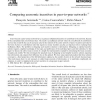Free Online Productivity Tools
i2Speak
i2Symbol
i2OCR
iTex2Img
iWeb2Print
iWeb2Shot
i2Type
iPdf2Split
iPdf2Merge
i2Bopomofo
i2Arabic
i2Style
i2Image
i2PDF
iLatex2Rtf
Sci2ools
107
click to vote
CN
2004
2004
Comparing economic incentives in peer-to-peer networks
Users who join a peer-to-peer network have, in general, suboptimal incentives to contribute to the network, because of the externalities that exist between them. The result is an inefficient network where the overall levels of contribution are less than would be the case if each peer acted in the interests of the entire network of peers. Incentives provided in the form of prices or contribution rules that require no money transfers can play an important role in reducing these inefficiency effects. The problem in designing such incentive schemes is information: Designing an optimal incentive scheme requires complete knowledge of the types and preferences of the individual peers and their identities. In this paper we discuss the above issues in terms of a simple but representative example by introducing the basic economic concepts and models. We then investigate the practical issue of designing several simpler incentive schemes requiring less information and compare their efficiency los...
Related Content
| Added | 16 Dec 2010 |
| Updated | 16 Dec 2010 |
| Type | Journal |
| Year | 2004 |
| Where | CN |
| Authors | Panayotis Antoniadis, Costas Courcoubetis, Robin Mason |
Comments (0)

